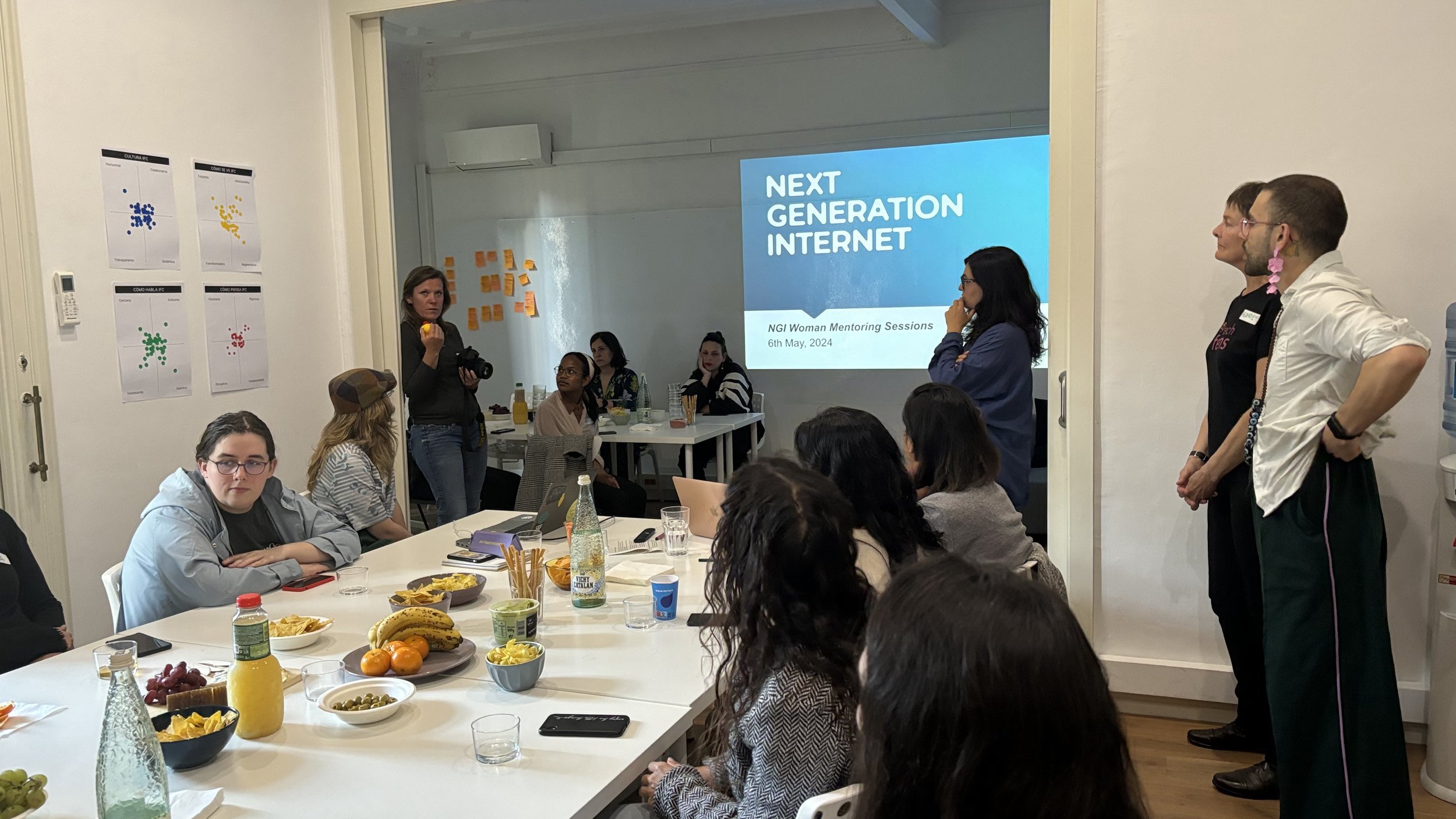Regenerative tourism
Regenerative tourism
Addressing the gender digital divide
Addressing the gender digital divide
11 de junio de 2024


By Anna Higueras, Project Manager, Paola Zanchetta, Consultant and Researcher and Giovanni Maccani, Head of the Research Area. (Original publication in English)
The low representation of women and LGTBIQA+ individuals in the technology and innovation sectors is a well-known problem. Recent statistics continuously highlight the shortage of women in STEM and digital innovation environments. Addressing this imbalance is a key objective of the New Generation Internet Outreach Office (NGIOO), which coordinates and supports the Next Generation Internet (NGI) community.
The NGI programme of the European Commission has been working since 2016 to foster the growth of a strong, cohesive open-source community committed to building a human-centred Internet. To date, it has funded over 1,000 innovative solutions, and new funding opportunities continuously arise. The dynamic ecosystem of the NGI encompasses a wide range of Internet building blocks, including digital identity, data sovereignty, decentralized technologies, blockchain, open web search, Internet architecture, data and artificial intelligence, network infrastructure, software engineering, protocols, interoperability, operating systems, and vertical use cases, among others.
Given the evident complexity of uniting such diverse communities, the first efforts were made to characterize the demographic variables of these teams - such as origin, background, interests, and gender distribution. Despite some limitations of the data (i.e., not all open calls ask applicants about their gender or the nature of the participating team), the resulting figures offer a revealing snapshot of the current landscape, which can be consulted in two more extensive documents: NGI Diversity and Inclusion Report - Deliverable 4.2, as well as in NGI Strategic Guidance Report Deliverables 1.2.
Representation in NGI: gender distribution
In order to better address gender inequalities, Ideas for Change (partner of NGIOO) conducted a specific analysis to gain a better understanding of the gender composition of NGI’s innovator teams. Data on gender was found in the NGI for 225 of the nearly 1,000 innovator teams (20% of all teams), encompassing 988 individuals. Key findings include:
86% (852 of 988 persons) identify as male, while 14% identify as female.
Women are present in 47% of NGI innovator teams while 53% consist solely of male participants.
Moreover, this gender distribution does not extend to leadership positions. Only 17 of the 225 analyzed teams are led by women, representing 7.6% of the total. This trend is not unique to NGI, but reflects broader patterns in the open-source sector, where women's participation is even more limited.
Broader context in open source
An examination of the wider open-source environment reveals more pronounced gender disparities:
Women constitute only 2.3% of contributors to the Linux kernel (Linux Foundation Report, 2020).
Only 4% of open-source contributors identify as women (GitHub survey, 2021).
Women represent 5.2% of contributors to the Apache Software Foundation (Trinkenreich et al., 2022).
Worldwide, women are lead developers in barely 5% of projects and authors of less than 5% of pull requests, despite having comparable or higher acceptance rates than men.
Addressing root causes and opportunities
It is crucial to understand the root causes of these disparities and identify opportunities to improve the representation of women and other minority genders in NGI and in the tech landscape overall. Ongoing actions within the NGIOO include desk research, conducting interviews with women in STEAM, developing webinars and tech mentoring sessions dedicated to women in technology to explain current funding and Open Call opportunities, and creating safe spaces for connection and information sharing. These initiatives foster a deeper understanding and generate practical ideas that will be integrated into the NGI programme in the near future.
A recent event organized by Ideas for Change at the IFC offices in collaboration with TechFems - a community of women+ in technology - highlighted several key ideas. The event brought together 30 women+ (women, non-binary participants, and transgender individuals) from diverse nationalities and backgrounds to discuss their experiences and challenges in the tech industry. Key takeaways from this enlightening session included:
Economic empowerment: many participants view tech careers as a means to combat poverty and the gender pay gap. This is especially important for minority and dissident genders, immigrants, and racialized groups.
Combating prejudice: the digital environment offers unique opportunities to fight gender and cultural biases. Participants agreed on ideas such as "if you can make the algorithm work, it doesn’t matter what you look like... the code should speak for us, not gender or any other peculiar aspect".
It was agreed that mentorship is crucial, based on some participants’ life experiences, and is seen as a catalyst to ensure the presence and continuity of many women+ in the tech environment. In many cases, mentorship was provided by someone close to them: family members, friends, teachers at school, or their partners.
Community support: receiving support from communities like TechFems is vital for entering the digital sphere since it can sometimes be difficult to find the right door when coming from migration or other complex social realities. However, it can also, and above all, enhance persistence in the tech field.
Delayed access to technology: migrants from the Global South often face delayed access to tech education, making mentorship and community support even more critical.
Self-demanding nature: the social pressure placed on women when seeking recognition and validation can have negative repercussions and could condition many women+ in technology. This perfectionism is often driven (and amplified) by the precision needed for correct coding.
Industry education: when receiving negative feedback that may influence women+, a common piece of advice shared in the room was: just ask. Ask the person why they treated you that way to initiate critical thinking about our interactions.
Ongoing efforts to address gender disparities in the tech sector are essential for creating a more inclusive and equitable digital landscape. The conclusions of this workshop and those that will be held in the future will serve as a foundation for NGI initiatives and guide regulatory and policy recommendations to promote diversity and inclusion in NGI and the tech ecosystem overall.
By Anna Higueras, Project Manager, Paola Zanchetta, Consultant and Researcher and Giovanni Maccani, Head of the Research Area. (Original publication in English)
The low representation of women and LGTBIQA+ individuals in the technology and innovation sectors is a well-known problem. Recent statistics continuously highlight the shortage of women in STEM and digital innovation environments. Addressing this imbalance is a key objective of the New Generation Internet Outreach Office (NGIOO), which coordinates and supports the Next Generation Internet (NGI) community.
The NGI programme of the European Commission has been working since 2016 to foster the growth of a strong, cohesive open-source community committed to building a human-centred Internet. To date, it has funded over 1,000 innovative solutions, and new funding opportunities continuously arise. The dynamic ecosystem of the NGI encompasses a wide range of Internet building blocks, including digital identity, data sovereignty, decentralized technologies, blockchain, open web search, Internet architecture, data and artificial intelligence, network infrastructure, software engineering, protocols, interoperability, operating systems, and vertical use cases, among others.
Given the evident complexity of uniting such diverse communities, the first efforts were made to characterize the demographic variables of these teams - such as origin, background, interests, and gender distribution. Despite some limitations of the data (i.e., not all open calls ask applicants about their gender or the nature of the participating team), the resulting figures offer a revealing snapshot of the current landscape, which can be consulted in two more extensive documents: NGI Diversity and Inclusion Report - Deliverable 4.2, as well as in NGI Strategic Guidance Report Deliverables 1.2.
Representation in NGI: gender distribution
In order to better address gender inequalities, Ideas for Change (partner of NGIOO) conducted a specific analysis to gain a better understanding of the gender composition of NGI’s innovator teams. Data on gender was found in the NGI for 225 of the nearly 1,000 innovator teams (20% of all teams), encompassing 988 individuals. Key findings include:
86% (852 of 988 persons) identify as male, while 14% identify as female.
Women are present in 47% of NGI innovator teams while 53% consist solely of male participants.
Moreover, this gender distribution does not extend to leadership positions. Only 17 of the 225 analyzed teams are led by women, representing 7.6% of the total. This trend is not unique to NGI, but reflects broader patterns in the open-source sector, where women's participation is even more limited.
Broader context in open source
An examination of the wider open-source environment reveals more pronounced gender disparities:
Women constitute only 2.3% of contributors to the Linux kernel (Linux Foundation Report, 2020).
Only 4% of open-source contributors identify as women (GitHub survey, 2021).
Women represent 5.2% of contributors to the Apache Software Foundation (Trinkenreich et al., 2022).
Worldwide, women are lead developers in barely 5% of projects and authors of less than 5% of pull requests, despite having comparable or higher acceptance rates than men.
Addressing root causes and opportunities
It is crucial to understand the root causes of these disparities and identify opportunities to improve the representation of women and other minority genders in NGI and in the tech landscape overall. Ongoing actions within the NGIOO include desk research, conducting interviews with women in STEAM, developing webinars and tech mentoring sessions dedicated to women in technology to explain current funding and Open Call opportunities, and creating safe spaces for connection and information sharing. These initiatives foster a deeper understanding and generate practical ideas that will be integrated into the NGI programme in the near future.
A recent event organized by Ideas for Change at the IFC offices in collaboration with TechFems - a community of women+ in technology - highlighted several key ideas. The event brought together 30 women+ (women, non-binary participants, and transgender individuals) from diverse nationalities and backgrounds to discuss their experiences and challenges in the tech industry. Key takeaways from this enlightening session included:
Economic empowerment: many participants view tech careers as a means to combat poverty and the gender pay gap. This is especially important for minority and dissident genders, immigrants, and racialized groups.
Combating prejudice: the digital environment offers unique opportunities to fight gender and cultural biases. Participants agreed on ideas such as "if you can make the algorithm work, it doesn’t matter what you look like... the code should speak for us, not gender or any other peculiar aspect".
It was agreed that mentorship is crucial, based on some participants’ life experiences, and is seen as a catalyst to ensure the presence and continuity of many women+ in the tech environment. In many cases, mentorship was provided by someone close to them: family members, friends, teachers at school, or their partners.
Community support: receiving support from communities like TechFems is vital for entering the digital sphere since it can sometimes be difficult to find the right door when coming from migration or other complex social realities. However, it can also, and above all, enhance persistence in the tech field.
Delayed access to technology: migrants from the Global South often face delayed access to tech education, making mentorship and community support even more critical.
Self-demanding nature: the social pressure placed on women when seeking recognition and validation can have negative repercussions and could condition many women+ in technology. This perfectionism is often driven (and amplified) by the precision needed for correct coding.
Industry education: when receiving negative feedback that may influence women+, a common piece of advice shared in the room was: just ask. Ask the person why they treated you that way to initiate critical thinking about our interactions.
Ongoing efforts to address gender disparities in the tech sector are essential for creating a more inclusive and equitable digital landscape. The conclusions of this workshop and those that will be held in the future will serve as a foundation for NGI initiatives and guide regulatory and policy recommendations to promote diversity and inclusion in NGI and the tech ecosystem overall.


